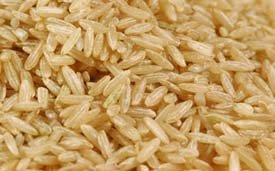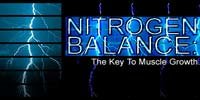
What Is It?
And Where Does It Come From?

L-Leucine (C6H13NO2) is an essential branched-chain amino acid (BCAA) that's broken down in fat structures. The other two essential BCAA's are L-Valine and L-Isoleucine.
L-Leucine can not be made by the body, and must be acquired through food or dietary supplements.

It can be found in nuts, brown rice and whole wheat bread products.

What Does It Do?
And What Scientific Studies Give Evidence To Support This?
L-Leucine comprises about eight percent of the total amino acid count in your body's protein structures; it is the forth most concentrated amino acid in skeletal muscle tissue.
As one of the three BCAA's, L-Leucine is essential to your basic health. It has athletic and medical applications.
L-Leucine has many beneficial effects on sports performance. It helps preserve lean muscle tissue1, it supplies the body with energy when under stress (i.e. when engaging in athletic activity)2, it preserves muscle glycogen (glucose stored in muscle tissue used to power muscular contraction), it maintains nitrogen balance, and it enhances thinking abilities that can decline as physical activity becomes more intense.3 It also works to heal bone, skin and muscle tissue.
| RELATED ARTICLE | ||
|
Additionally, L-Leucine may increase somatropin (HGH - Human Growth Hormone) secretion - a hormone that may lead to healthier joints, a slowing (and possible reversal) of the ageing process, decreases in body fat, and increases in strength and muscle mass.
The effects of L-Leucine in the diet are profound. As the strongest of the BCAA's, L-Leucine is what's known as a "limiting nutrient" - meaning that you must have enough L-Leucine in proportion to other amino acids in order for your body to make use of what you eat.
 |
Simply: If you suffer from an L-Leucine deficiency, your body will not be able to make use of the protein that you give it - no matter how much protein you consume. And, unless you have enough L-Leucine, the money you spend on quality food and dietary supplements will be wasted. |
 |
 |
||
To make the most of what you eat, you need two parts L-Leucine and two parts L-Valine for every one part of L-Isoleucine. You'll fail to get optimal results if you fall short of meeting this exact ratio.
Medically, L-Leucine has several uses, the first of which is in the treatment of Amyotrophic Lateral Sclerosis (ALS) - Lou Gehrig's disease. This disease is a serious neuromuscular disorder that affects more than thirty thousand people across America, with more than 5,000 newly diagnosed cases every year.
 |
Why Is It Called Lou Gehrig's Disease? In the United States, ALS is often called Lou Gehrig's disease because of New York Yankees' star Lou Gehrig, who was diagnosed with ALS in the 1930s. Lou Gehrig's disease refers to a disorder called amyotrophic lateral sclerosis (say: ah-my-uh-tro-fik lah-tuh-rul skluh-ro-sis), or ALS. The official name comes from these Greek words:
|
 |
 |
||
L-Leucine has shown promise as an adjunct to conventional ALS therapies because it can improve muscular strength in ALS patients by acting with the other BCAA's to activate glutamate dehydrogenase.4
People with liver and kidney problems can also benefit form L-Leucine supplementation because it can enhance liver protein synthesis and improve breathing ability and quality of sleep for those with kidney disorders.5
Finally, L-Leucine may lower blood sugar levels and normalize and control insulin release and insulin function. Because of this, diabetics may find L-Leucine a helpful addition to their disease management program.

Who Needs It?
And What Are Some Symptoms Of Deficiency?
L-Leucine is an essential amino acid. Therefore, everyone needs Leucine to maintain basic health.
L-Leucine deficiency can result in muscle wasting, depression, low energy levels, muscle weakness, and blood sugar irregularities like hypoglycemia.
| Essential Amino Acids | Nonessential Amino Acids |
| Histidine | Alanine |
| Isoleucine | Arginine |
| Leucine | Aspartic Acid |
| Lysine | Cysteine |
| Methionine | Cystine |
| Phenylalanine | Glutamic Acid |
| Typrophan | Glutamine |
| Valine | Glycine |
| Proline | |
| Serine | |
| Threonine | |
| Tyrosine |

How Much Should Be Taken?
And Are There Any Side Effects?
As discussed above, L-Leucine should be dosed at two parts L-Leucine for every two parts L-Valine and for every one part of L-Isoleucine.
Strictly adhere to label directions.
No side effects have been reported, and this BCAA is generally considered to be safe for healthy persons.
Consult your physician before using any dietary supplement.
 To View Top-Selling L-Leucine Products, Click Here.
To View Top-Selling L-Leucine Products, Click Here.
- MacLean DA, Graham TE, Saltin B. Branched-chain amino acids augment ammonia metabolism while attenuating protein breakdown during exercise. Am J Physiol 1994;267:E1010-22.
- Mittleman KD, Ricci MR, Bailey SP. Branched-chain amino acids prolong exercise during heat stress in men and women. Med Sci Sports Exerc 1998;30:83-91.
- Blomstrand E, Hassmen P, Ekblom B, et al. Administration of branched-chain amino acids during sustained exercise-effects on performance and on plasma concentration of some amino acids. Eur J Appl Physiol 1991;63:83-8.
- Plaitakis A, Smith J, Mandeli J, et al. Pilot trial of branched-chain amino acids in amyotrophic lateral sclerosis. Lancet 1988;1:1015-8.
- Soreide E, Skeie B, Kirvela O, et al. Branched-chain amino acid in chronic renal failure patients: respiratory and sleep effects. Kidney Int 1991;40:539-43.

